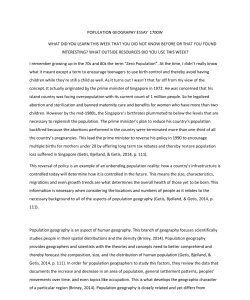POPULATION GEOGRAPHY ESSAY I remember growing up in the 70s and 80s the term “Zero Population”. At the time, I didn’t really know what it meant except a term to encourage teenagers to use birth 1700W
POPULATION GEOGRAPHY ESSAY I remember growing up in the 70s and 80s the term “Zero Population”. At the time, I didn’t really know what it meant except a term to encourage teenagers to use birth 1700W
POPULATION GEOGRAPHY ESSAY 1700W
WHAT DID YOU LEARN THIS WEEK THAT YOU DID NOT KNOW BEFORE OR THAT YOU FOUND INTERESTING? WHAT OUTSIDE RESOURCES DID YOU USE THIS WEEK?
I remember growing up in the 70s and 80s the term “Zero Population”. At the time, I didn’t really know what it meant except a term to encourage teenagers to use birth control and thereby avoid having children while they’re still a child as well. As it turns out I wasn’t that far off from my view of the concept. It actually originated by the prime minister of Singapore in 1972. He was concerned that his island country was facing overpopulation with its current count of 1 million people. So he legalized abortion and sterilization and banned maternity care and benefits for women who have more than two children. However by the mid-1980s, the Singapore’s birthrates plummeted to below the levels that are necessary to replenish the population. The prime minister’s plan to reduce his country’s population backfired because the abortions performed in the country were terminated more than one-third of all the country’s pregnancies. This lead the prime minister to reverse his policy in 1990 to encourage multiple births for mothers under 28 by offering long term tax rebates and thereby restore population loss suffered in Singapore (Getis, Bjelland, & Getis, 2014, p. 111).
This reversal of policy is an example of an unbending population reality: how a country’s infrastructure is
